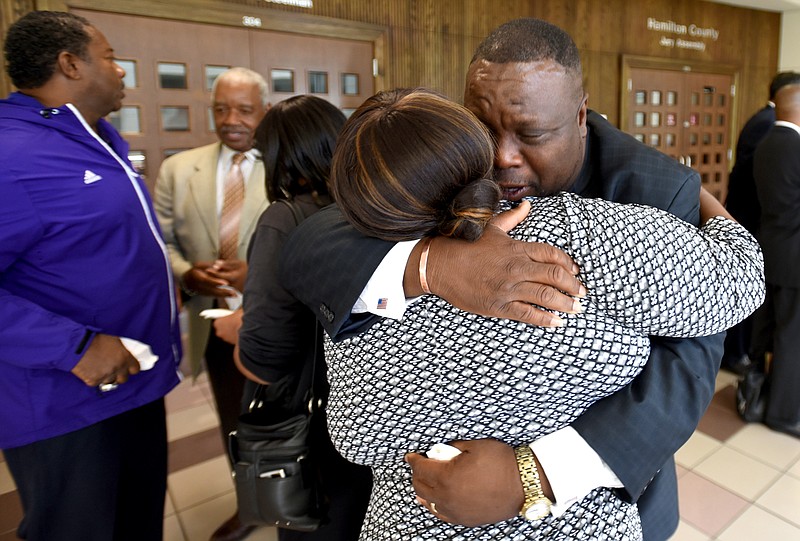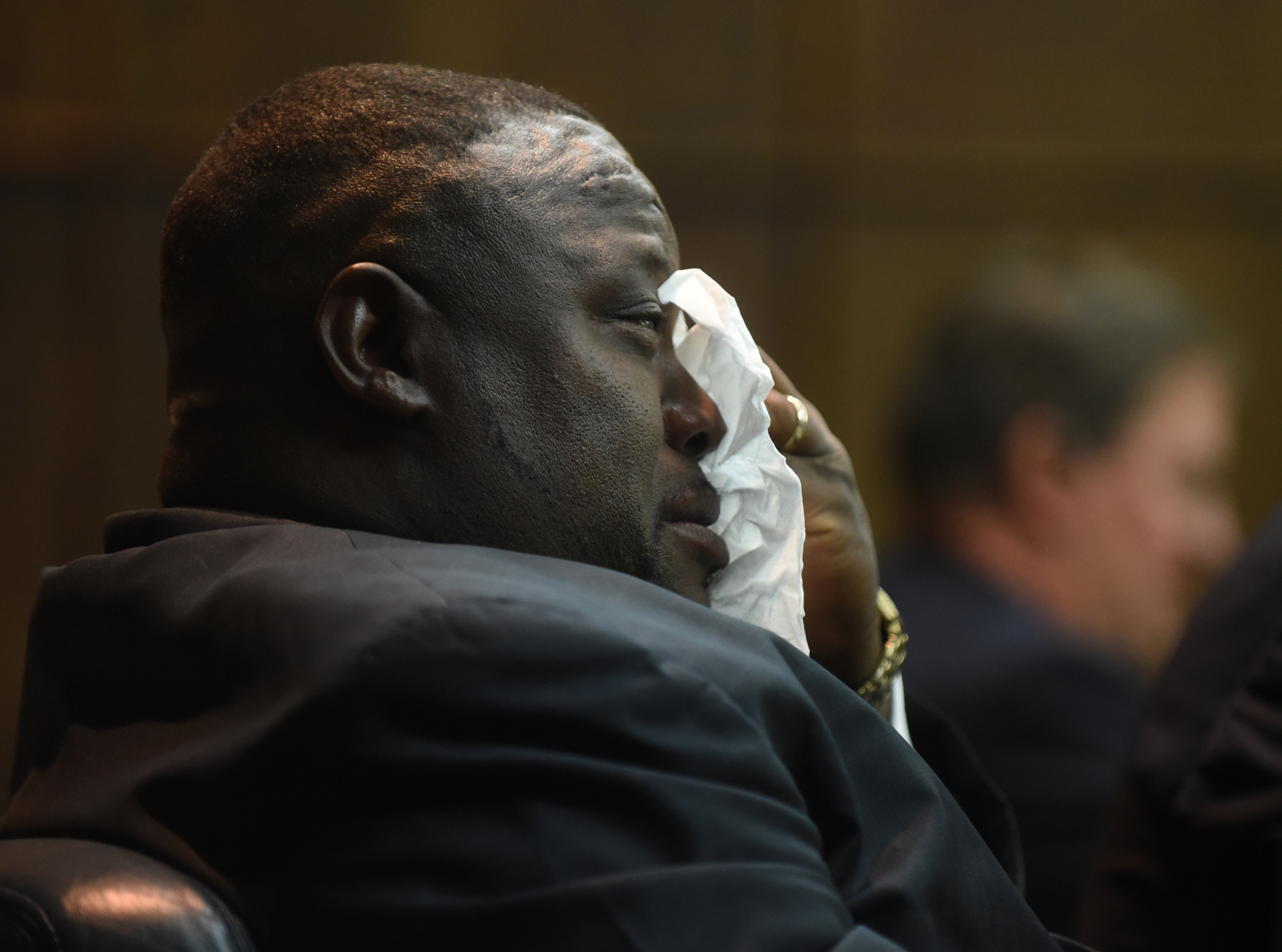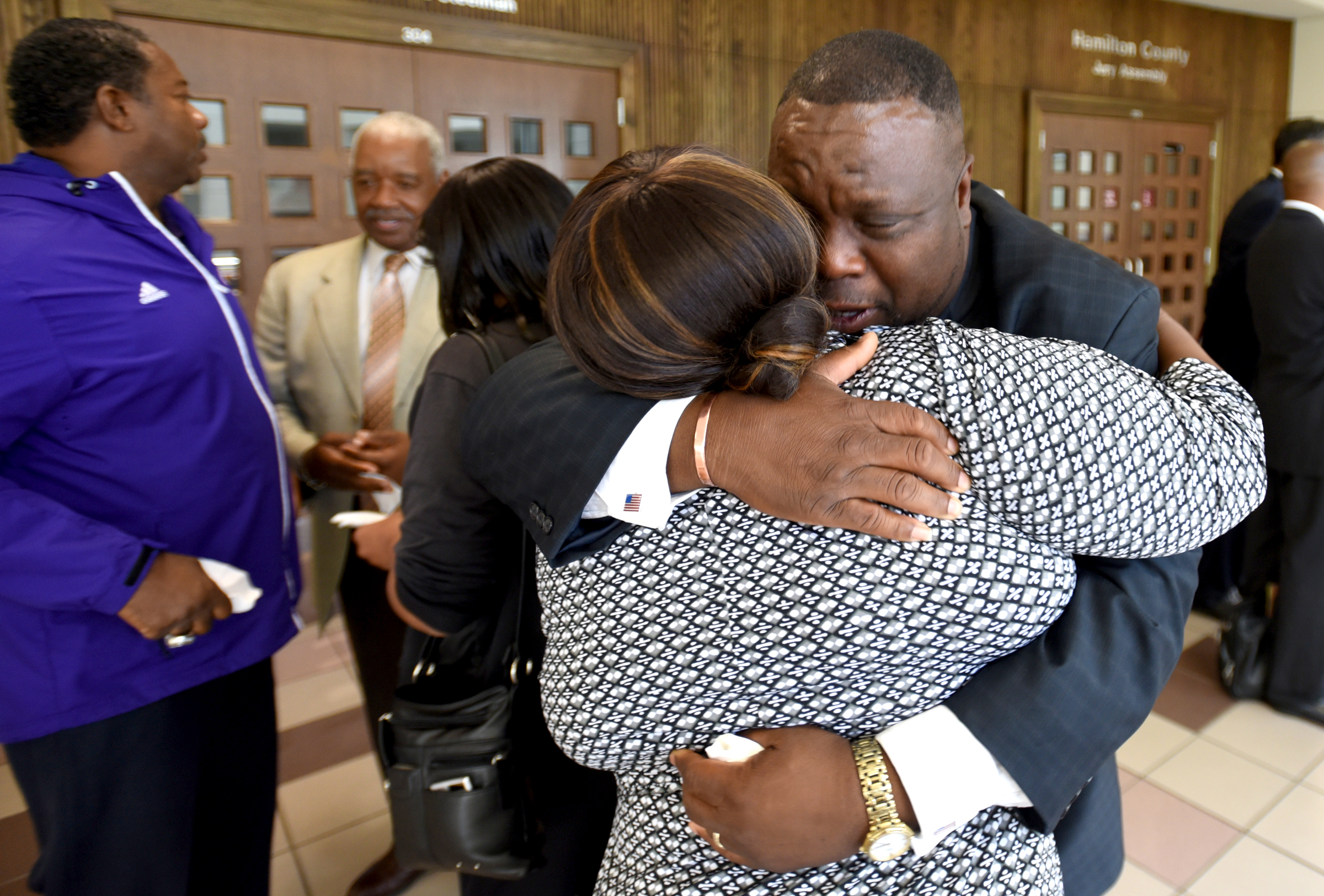He's been punished even though he's been acquitted. He's lost a lot even though he's not guilty."
Richard Bennett is vindicated.
His attorneys said it, over and over, after a Hamilton County Criminal Court judge acquitted Bennett of possession of marijuana charges Tuesday. The acquittal came after a judge ruled there was not enough evidence to hand the case to a jury, ending a year of tumult during which Bennett saw his nonprofit organization, A Better Tomorrow, lose its partnership with Chattanooga's Violence Reduction Initiative.
Bennett's attorneys say he didn't just lose funding. He lost his reputation. He lost respect.
"He's been punished even though he's been acquitted," defense attorney Bill Speek said. "He's lost a lot even though he's not guilty."
Bennett was arrested June 6, 2014, near a pond at East Lake Park. Police said he was found in a parked car with a woman named Qwantana Holiday, with open containers of Budweiser and Patron tequila, hydrocodone pills and a plastic bag containing less than 2 grams of marijuana.
He was charged with two counts of possession of a controlled substance and violation of open container laws, all misdemeanors.
At the time, Bennett's A Better Tomorrow nonprofit was poised to take on an even greater role as the main community outreach arm of the city's fledgling Violence Reduction Initiative. Bennett's work would be key to the initiative's success, as he would work to connect felons and gang members with jobs, education and counseling with the help of a $300,000 grant.
But the city dropped its affiliation with Bennett as soon as word of his arrest spread. Hope for the Inner City was instead tasked with outreach. While some community leaders said the move was necessary, others said the city should have shown more support.
"From a PR standpoint, you can certainly understand it," defense attorney Gerald Webb said Tuesday. "But we would have hoped they would have just waited."
Bennett, meanwhile, has always maintained his innocence. He passed a drug test and said he never smokes marijuana. He said he was working the night of the arrest, and denied the drugs were his. He even had a prescription for the hydrocodone. Two of three charges against him were dropped in September, leaving only the possession of marijuana charge. Bennett's attorneys pushed that toward a trial as quickly as possible -- in order, they said, to clear his name.
Tuesday's trial was brief. Chattanooga Police Department Officer Steve Bulkley testified that on the night of June 6 he received a BOLO, an order to "be on the lookout," for a van like the one Bennett was driving. During a hearing before the trial began, attorneys determined that information about an anonymous tip pointing to Bennett's van wouldn't be allowed at trial.
Bulkley said when he saw the van parked in the closed park, he trained his spotlight on the back of the vehicle. He saw Bennett standing outside the driver's side and a woman in the van, on the floor, on the passenger side.
When he asked Bennett for his ID, Bennett accidentally pulled a piece of paper out of his pocket and dropped it on the floor, then tried to quickly stuff it back in. Bulkley thought that was suspicious, he said, so he handcuffed Bennett while he assessed the situation.
Another officer arrived and found the marijuana in Bennett's glove box.
Speek asked Bulkley if he ever saw Bennett with the drug. He said he hadn't.
"You don't know how that marijuana got into the glove box," Speek said. "You don't know who put it there. You don't know whose marijuana it is."
When Bennett's passenger, Holiday, took the stand, she denied ever being in the car. The police arrived just seconds after she did, she said. Holiday said her relationship with Bennett was strictly platonic -- that for five years, he'd helped her put her life back together with small amounts of gas money and other help. She was meeting him for gas money that night.
She also denied putting the marijuana in the glove box, though Speek insinuated during opening arguments that she could easily have slipped it inside while police searched Bennett.
Bennett's wife, Jessica, suggested another explanation.
The van Bennett was driving that night was registered to A Better Tomorrow, and was regularly driven by staff who would take at-risk youth to General Sessions Court and other places. As many as five other people could have operated it around that time. Bennett was only driving it that night because he'd needed to meet Holiday and his truck had been blocked in by her car, she said.
After Jessica's testimony, Richard Bennett initially told Steelman he would testify in his own defense. But during a brief recess, he apparently changed course, telling Steelman he wouldn't testify. The defense rested without calling any witnesses, but Steelman ruled the jury shouldn't even deliberate on the case.
He explained that in a possession of marijuana case, the burden was on the state to prove that Bennett knew the marijuana was in the van, and to do so in a way so that he and the jury would have "moral certainty."
The state failed, he said.
Given the testimony that other drivers could have operated the vehicle, that Bennett was never seen holding the marijuana, and that he wasn't even in the vehicle when it was found, Steelman said he didn't have that level of certainty.
"The court really has to ask, should the court even allow a jury of lay people to speculate as to whose marijuana it is?" Steelman said.
He acquitted Bennett, who put his head in his hands and loudly wept. The jury was sent home.
"What happened in there almost never happens," Webb said afterward.
Outside the courtroom, supporters and family slapped Bennett on the back and shook his attorneys' hands. He declined to comment, but Speek told him this was what he'd been waiting for the last year. He'd been vindicated, he said. He should celebrate.
"I hope people will look at this as an example of not rushing to judgment of an individual," Webb said.
Bennett will continue his work with at-risk youth, Webb said.
And he just might understand a little better what it's like for the accused.
Contact staff writer Claire Wiseman at cwiseman@timesfreepress.com. Follow her on Twitter @clairelwiseman.


